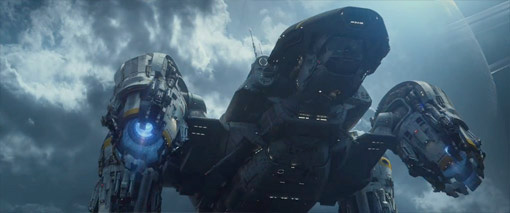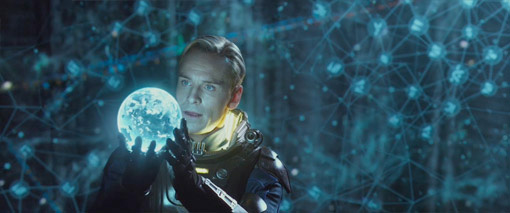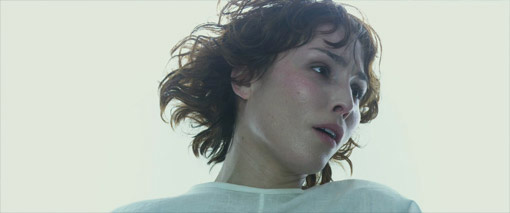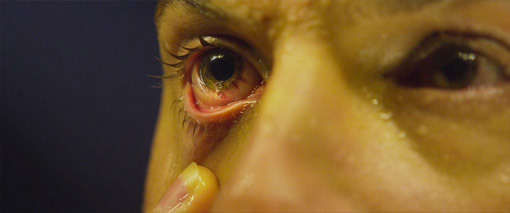|
Part 1
| Disclaimer: I am reviewing the 3 Disc Collector's Edition of the film because I'm very curious about the three hours and forty minute 'Making Of' documentary that only comes if you buy the premium version. However, for a review of the home 3D version, you'll have to look elsewhere. The 3D in the cinema was acceptably un-distracting (and I'm no fan of 3D thinking that this fad will fade away as it has repeatedly done so in the past) but I have had no experience of domestic 3D. I could tell you what it's like to wear glasses but I suspect that's not why you're reading this... Let's get on. |
| |
The immortal Prometheus was bound to a rock, where each day, an eagle, the emblem of Zeus, was sent to feed on his liver, only to have it grow back to be eaten the next day. |
| |
Wikipedia entry on Prometheus, the fire stealing demi-god |
| |
Doing science fiction at a high level is tricky. It's really tricky. History is straightforward, because I'm probably retelling a story and I've got points of reference. Science fiction, there's (sic) no points of reference; it's all brand new. But that's also what makes it interesting. That's what makes it fabulous is that anything goes. |
| |
|
Almost anything... But I see what he means. Surely some rules still apply in terms of narrative, fulfilling expectation, in short delivering. My enthusiasm for the 3D experience of seeing Prometheus when it first came out was unevenly bolstered by a ludicrously heightened expectation and probably sent me a little too far forward when it came to communicating my appreciation. I'm not saying my cinema review (here) is invalid but I will point to the final paragraph, all those pesky things that undercut the reality and plausibility of the movie for me. Instead of the trivial points of argument dissolving over time, they became more tangible and threatened to engulf and poison the entire experience of watching the movie. All of these topics are now being endlessly debated online (Scott's intentions?). There's even a religious symbolism piece (referenced in the Extra Features) making the rounds and once you start down that road, you start seeing biblical nods everywhere. I know Scott likens movies to multi-layered cakes rewarding repeated viewings but with his latest, even the sly intelligence packing his movie full of debatable points can be undermined by a simple, logical examination of the script. Yes, the editing process also shapes the tone, mood and meaning of the film as some of the deleted scenes prove. But in the end, we are left with Scott's decisions on what to excise and whether his film was hurt by those omissions and what aspects of his movie were subsequently rendered as question-generators, both negatively and positively.

On the back cover of Total Film last month was the one page marketing push for the Blu-ray release. It said boldly over a close up of an alien Engineer; "Prometheus has landed. Questions will be answered." Excuse me? Now, I am a big fan of ambiguity in movies, I delight in being teased. Were the ghosts real in The Innocents or were they all in the imagination of the governess? That's not only a justifiable question. It's one the film-makers intended us to ask. That's great film-making. Stuffing your movie with a bucket-load of moments that elicit a number of "Hang on..."s and "Wait a minute..."s and you've no right to bridle at the tsunami of nit-picking that ensues. So the marketing reflected the way the movie was accepted (or not) in the cinemas (which fascinates me). But it also infuriates. The studio is being willingly compliant with the non-resolution of any of the big questions in their own film. I guess no one gives a toss as long as it made/will make money; 400 million dollars worldwide before disc sales. I guess Scott could have put cue cards up saying "I don't know why the damn Engineers want to kill all humans either!" pressing great wadges of Twentieth Century Fox cash into flight bags as he does so. Asked how the original alien in his 1979 shocker got into the shuttle with Sigourney Weaver, Scott deadpanned truthfully, "We needed an ending."
When I was a lowly director's assistant in the mid-80s, I was asked to go through each scene in the movie's script and make a note whether all the doors in the rooms were open, closed or locked. Regardless of the order of shooting, we were assured of continuity. The continuity person would normally do this at the time of filming but this particular director was very meticulous. He wanted to make sure that while watching his film, there would be no one out there who could justifiably say "Wait a minute. How can he get in there when the door was dead bolted about twenty scenes ago?" Well, there are other directors and writers who are just as smart who either; (a) simply dismiss the idea of making a logic sweep of their work or (b) trust their storytelling so much believing that no one would notice or (c) present some very valid (to them) reason for leaving something in the script, starkly open to question. There is another option – the logic slips weren't noticed but that's hardly likely and frankly a preposterous suggestion. Whatever choices were made throughout the production of Prometheus, those logic slips would have been endlessly discussed, discarded, argued over, defended and explained. It's the choice of the ones that were pushed through the usually stringent net of common sense and reason that I'm concerned with. And from the commentaries, it's starkly obvious that one of the writers knows exactly what scenes I'm talking about. He all but apologized for them.

Yes, great storytelling can make you conveniently gloss over some glaring blunder (someone please tell me how Indiana Jones and Marion Ravenwood (a) didn't get captured and shot by all the other German soldiers on the island at the end of Raiders of the Lost Ark and (b) find a way off the island? I'm assuming it takes more than two to pilot a submarine. Did we care about that at the time? No, of course not. There's only the Washington DC coda remaining and we had just seen God's wrath (actual God!!!) so we couldn't complain. In the writers' commentary track, Prometheus co-scribe Damon Lindelof states on record that he tries very hard never to explain anything leaving it up to the viewer to imagine a likely answer or even an unlikely one. He openly admits this may be frustrating (really?) and my argument back (while I broadly applaud the idea behind his own style) is that when that questioning damages the movie it's in, it's harmful to the experience, putting a rent in its very essence described by the buzzword 'immersive'. You can't enjoy scuba diving if every few minutes you're yanked back on to the boat. You can get away with this on TV. Lindelof's own work on the show Lost depended on it. Once logic has pulled you out of the film, it's the case of a spell that should never have been broken in such an avoidable way. On TV, you always have next week to fall back on. In a cinema, there is no 'next week'. When escapee Tony Stark blasts off, away from his Afghani captors and crashes into the desert in Iron Man, so much of my brain was screaming at the writers, "At least make some pathetic concession to reality, an anti-gravity field or retro-rockets in the suit's shoe soles, something (ANYTHING!!!) to combat the obvious fact that no human being can survive a fall and sudden ground hit despite being encased in metal. He's liquid paté along with Indiana Jones in his nuclear detonated lead fridge." Sigh.
You have to provide a crumb from which we may extract a sumptuous meal of our own imagining. There are no crumbs in Prometheus (a few are on the cutting room floor) but there are some really genuinely ridiculous things that should have been expunged in screenplay draft number one. Co-writer Lindelof's defence of the extraordinary stupidity of the biologist, Millburn (he's a xeno-biologist and therefore is extra, extra – EXTRA – fascinated) is not convincing for one watertight reason. The character is just as freaked as the geologist Fifield by the dead Engineer and has the good sense to walk away then (when he was essentially 'safe' with the others). Alone in a cavern of black goo facing a snake like creature, he suddenly advances and in all but actual words used, he invites this thing on to his lap. It was like watching a man step off a cliff with a smile on his face and then witnessing him surprised to find himself plunging to a messy end.

In our world, a snake like creature (I think they're called 'snakes') is approached with caution (especially by frickin' experts). In another, alien world I would put the caution scale up to eleven point five. It's just too ridiculous. Even more ridiculous was Lindelof's bald-faced acknowledgement of this stupidity in his commentary. He actually spells out what you or I or any sane person would be doing in the same situation. There must have been a more creative, a more believable way to write the scene without sacrificing essential believability... Off the top of my head... (taking into consideration the excision of the scene where the scientists find a living alien worm, one of the deleted scenes).
212. INT. ENGINEERS' WEAPON HATCHERY DAY 212
Fifield and Millburn flinch at the sight of something as big as a Conga eel moving quickly through the black goo.
MILLBURN
Did you see th...
FIFIELD
Yeah, which is why we're leaving.
Fifield grabs Millburn and yanks him backwards.
MILLBURN
But it's alien life. Fifield, it's alive!
FIFIELD
And now I'm warming to the dead ones. Let's go.
As the two men stumble towards the entrance to the hatchery, Millburn reluctant, the object streaks through the goo, overtaking them. Millburn hesitates and looks over his shoulder.
FIFIELD
MOVE!
As Fifield and Millburn turn to run into the corridor, the alien snake – the hammerpede - rears up and with a whiplash, bites into Millburn's hand... Bone breaking and body horror ensue.
Excuse me, but what – in the seven levels of hell – is wrong with that? They are running away (believable) but they get attacked anyway (just as believable). Sigh.

And then there are the oddly cut scenes that make me think directors and editors have been compromised. These 'mistakes' do leak into final versions. There is an absurd cut in Jurassic Park (it's in the scene featuring the passengers of the jeep trying to out run the T-Rex, the cut after Muldoon, (Bob Peck), says "Bloody move!"), a cut that editor Michael Kahn normally would never make. There must have been an FX shot originally planned to be inserted in between the two shots – horribly ill-matched – that was cut out or never used for some reason (time and money probably). As the Engineer, in the first scene of Prometheus, shrugs off his robe, the camera moves down and there is a bizarre and very startling cut to the upright Engineer leaning down to pick up the dish from which to sip. It really jolts. As it plays, the cut on the movement is awkward, unwieldy and seemingly completely unnecessary. I played this scene to a colleague of mine, a professional editor, and he remarked upon the same cut without being primed. It's not just me, hallelujah. Prometheus's editor, the talented Pietro Scalia (watch Kick Ass), is no rookie or slouch. There must have been a reason that that cut was executed (lack of coverage? That's hard to accept). Maybe it was just one of those placeholder cuts that Scott never questioned so it stayed put.
Editors can save scenes with a bit of devious chicanery. Editor Scalia demonstrates this with a sneaky aplomb. Shaw's scientist boyfriend, Holloway, takes off his ring, places it on the sink and examines his eye. The close up on the ring going down always bothered me. The hand performing the action seemed shaky, in pain. The close up of the ring being picked up by Shaw after she has (uh...) 'self-medicated' is exactly the same shot but its previous use had been graded differently, reversed and flopped (left and right transposed). For some reason, Holloway's ring close up (no tittering) was never shot or it was a decision late in shooting to have Shaw find and put on his ring. You will find examples of this 'edit-fix' in every film if you chose to look closely enough. And a movie like Prometheus invites hard scrutiny. That's the burden of being Ridley Scott.
Before we dive into an inordinate embarrassment of riches, Extras-wise, there's one more question (will it ever be answered? Does Fox care?) The motivating drive to send the ship into deep space to meet our makers was a 'star map' found all over the world. Why would an alien race point out the location of their home world to their little extra terrestrial descendants when it's not their home world at all but a bloody derelict planet brimming with the most devastating genetic weapons designed to wipe out life? It's funny. The deeper you go, the more questions are thrown up (after all, it's only a movie). That said, Prometheus is a good slice of superior cinematic science fiction that very naughtily presages a potential sequel where all of our questions should (in an ideal, ahem... alien world) be answered. Bet they won't be though... And if they say "Questions will be answered, no. Honestly, they will..." on the marketing of the sequel's Blu-ray, then I really will go postal.
It's Ridley Scott. It's Blu-ray. It's 2012. It looks stunning. Were you expecting any other judgment on the technical merits of this box set? It's a wonder to behold. The balance between subtle and huge digital spectacle as well as 'shot in camera' effects is never tipped to one or the other side. Visually, the movie is extraordinarily consistent and 'real' looking. I was thrilled to find in the 'Making of...' that a lot of what I thought was digital was old school film-making and it made me very, very happy. The exterior planet scenes have a rough brown hue whilst the gleaming interiors of the ship are wonderfully sharp and detailed. And the holograms are just gorgeous. You could hate the movie from here to Reykjavik but you have to admire the never less than stunning look and the feel courtesy of Mr. Scott and his superb cinematographer, Dariusz Wolski.

Let's not skimp on the sound. Although I have yet to trade up to a new amplifier to take advantage of the offered DTS HD 7.1 (soon, my pretties, soon), the DTS 5.1 mix extrapolated from the 7.1 is just gorgeous. Both rears and sub-woofer are almost always on duty and aside from one or two lines of dialogue that were so clear I couldn't understand them (I know, but it's true), I have to give the mix work here a solid two thumbs up. It's rich without bludgeoning your cochlea into submission, subtle when it needs to make a point and it boasts a dynamic range that really renders whispers as whispers and stormy conditions as "Turn that bloody thing down!" being screamed from the kitchen. The only problem with superior dynamic range – most of us don't live on isolated farms...
There are multi-language sub-titles... English, Spanish, French, Danish, Dutch, Finnish, German, Italian, Norwegian, Portuguese, Russian, Swedish, Chinese, Czech, Greek, Hungarian, Korean, Polish and Thai... And there are also sub-titles for the deaf and hard of hearing (and also mixes in a whole slew of languages; Spanish, French, Portuguese, Hindi, Tamil, Telugu, and Ukrainian Dolby Digital 5.1 and Russian DTS 5.1).
Part 2 – Extra Features >
|